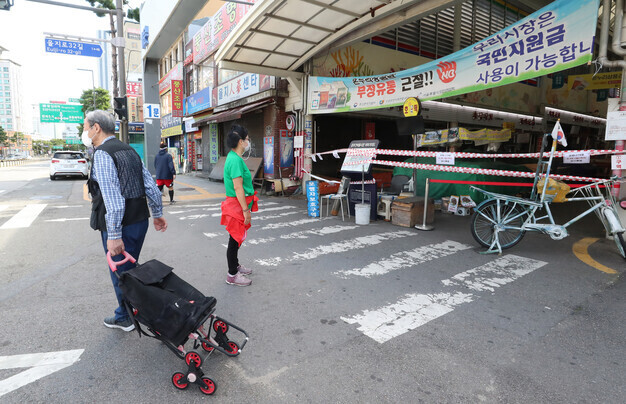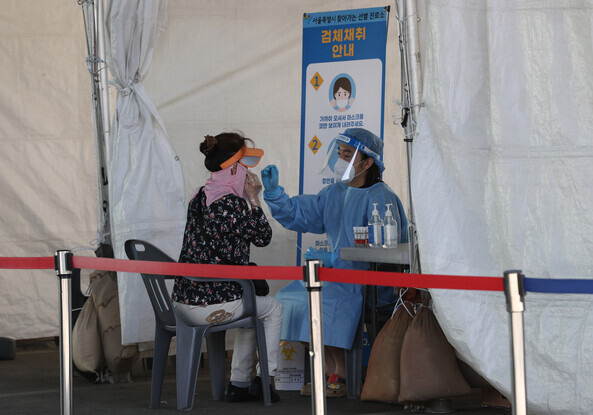COVID-19 cases surge to record high after Chuseok holiday, experts brace for more severe cases
이 글자크기로 변경됩니다.
(예시) 가장 빠른 뉴스가 있고 다양한 정보, 쌍방향 소통이 숨쉬는 다음뉴스를 만나보세요. 다음뉴스는 국내외 주요이슈와 실시간 속보, 문화생활 및 다양한 분야의 뉴스를 입체적으로 전달하고 있습니다.

With the number of confirmed cases of COVID-19 exceeding 3,000 for the first time in Korea, the government has urged people to cooperate by practicing stricter social distancing, including refraining from taking part in private gatherings on two consecutive days. Experts are calling for the prompt provision of hospital beds and medical workers to prepare for a surge in the number of severe cases.
The number of confirmed cases of COVID-19 on Sunday reached 2,771 (including 36 from abroad), after a record 3,272 cases on Saturday.
Saturday was the first time the daily number of cases has broken 3,000 in the country since the first confirmed case on Jan. 20 last year. The Korea Disease Control and Prevention Agency (KDCA) on Saturday said the week of Sept. 19-25 averaged 2,028.7 infections per day — up 230.1 cases or 12.8 percent from a week earlier — with the greater Seoul area seeing three times the cases of the rest of the country.
With 1,096,862 people waiting on their results after being tested for COVID-19 as of midnight Sunday, it is likely that the number of confirmed cases will remain high. The rise in confirmed cases was faster than initially expected by the government, which had said that with uninterrupted vaccinations and continuance of higher social distancing levels, the fourth wave of the pandemic would gradually diminish after peaking between Sept. 5-20.
But after the number of new COVID-19 cases rose above 3,000, Jeong Eun-kyeong, commissioner of the Korea Disease Control and Prevention Agency, held an emergency briefing on Saturday at which she warned that the daily count could rise over the next week or two.
“We will monitor proliferation through next week before deciding whether to proceed [with a gradual return to normal],” Jeong said.
“We had been expecting this to some extent, but the situation is very serious given the scope and speed of the increase,” said Prime Minister Kim Boo-kyum during a meeting of the Central Disaster and Safety Countermeasure Headquarters on Sunday. Kim asked members of the public to keep private gatherings to a minimum.
“The spread of cases in the greater Seoul area isn’t slowing, and the caseload in the rest of the country is on the rise. That’s expected to continue through this week, when the incubation period [for infections] during the Chuseok holiday comes to an end,” Kim said.

Experts agree that now is a critical time to line up hospital beds and medical personnel. Assuming the current daily rate of 2,500-3,000 holds steady, there are enough beds to house seriously ill COVID-19 patients for at least one to two weeks. But if the caseload rises, more patients will need to be hospitalized, which could place a burden on the medical system.
“It takes a week or two after diagnosis for COVID-19 cases to become serious. We’re currently dealing with around 330 serious and critical cases. Even if only one percent of confirmed cases become serious or critical, that would still place a serious strain on medical resources in the greater Seoul area,” said Eom Joong-sik, a professor in the department of infectious disease at Gachon University Gil Medical Center.
By Kwon Ji-dam, staff reporter
Please direct questions or comments to [english@hani.co.kr]
Copyright © 한겨레. 무단전재 및 재배포 금지.
- 한국, IAEA 의장국 만장일치 선출…일본 ‘독점’ 깨고 64년 만에
- “나도 회사에 올인하는데…” 곽상도 아들 ‘퇴직금 50억원’ 꼬집는 말들
- [Q&A] 심근염 생긴다는데…우리 아이, 코로나19 백신 꼭 맞아야 할까요?
- ‘산재 위로금 44억’…곽상도 아들, 산재 신청 없었다
- “식자재 물가 올라도, 가격 인상은 못 해요” 자영업자들 ‘쓴 한숨’
- 화천대유 알짜 사업, 대장동 테라스하우스 분양수익은 얼마?
- “기후위기, 2020년생은 1960년생보다 폭염 7배 많이 겪을 것”
- 국민의힘 초선 의원들 “곽상도 국민 우롱…사퇴하라”
- 코로나 여파…기대수명, 2차대전 이래 최대폭 감소
- ‘오징어 게임’ 속 피해번호…제작진, 지울 ‘노력’은 안 해봤나요